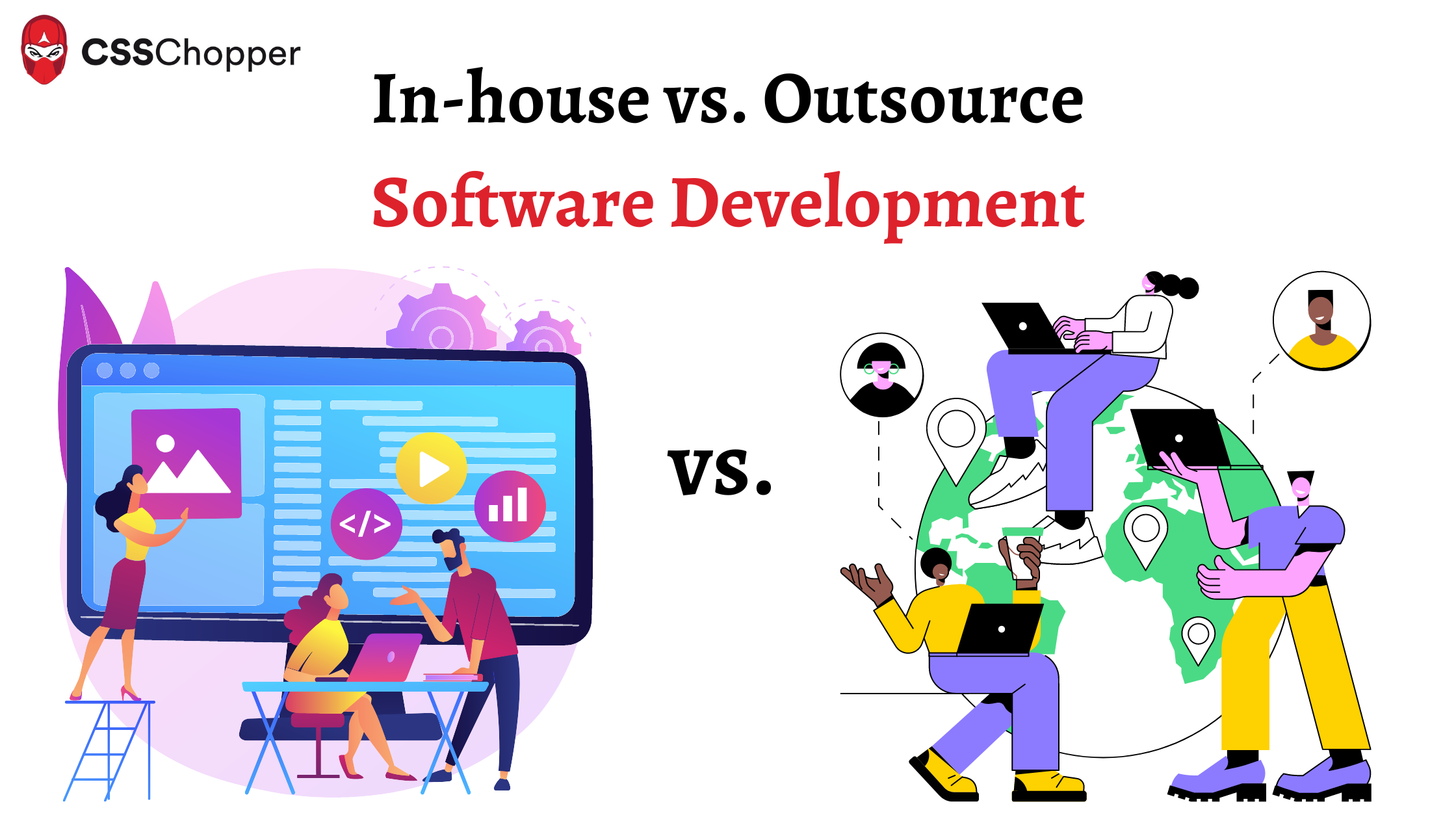- The Dilemma
- In-house vs Outsource Development - A Brief Comparison
- Pros and Cons of In-house Development
- Pros of In-house Development
- Cons of In-house Development
- Outsource Development
- Benefits of Outsource Development
- Cons of Outsource Software Development
- Factors to Consider Before Deciding on In-house vs Outsource Software Development
- Making the Decision
- Experience Difference in Outsource Custom Software Development with CSSChopper?
The debate on in-house vs outsource development is a hot topic amongst diverse businesses, with both sides touting the advantages of their preferred approach. With the relentless progress of technology, deciding the right option amongst them can be difficult.
In-house development enables easy communication with face-to-face interactions, while outsourcing allows you to tap technical talent outside your current field. While one can be expensive, the other forces you to contend with cultural differences. The choice between both of them depends on the preference of your business.
From fostering innovation within the company to tapping into the expertise of external partners, this choice between insourcing and outsource software development is challenging.
The Dilemma
The majority of businesses fall into a dilemma when it comes to developing a web solution. They wonder whether they should opt for in-house development or hire a dedicated team of professional developers to complete this task. You have three main options in that case:
- Either hire a team of developers or work on a project with an in-house team,
- Outsource the complete project to an experienced company,
- Or combine in-house and outsource developers’ expertise.
The decision to choose between them will completely depend on your business goals, project, and location. Before selecting the right option, ensure that you have analyzed the options carefully. Identifying the pros and cons of both development types is crucial in the process of making an informed decision.
In-house vs Outsource Development – A Brief Comparison
When a business uses the company’s internal resources, this can be stated as in-house development. But this requires adequate and sufficient resources for the company to head on towards this step.
Comparatively, outsource software development is the process of developing a web solution through third-party developers. If the core competencies for the required project are not matched within the company, outsourcing comes in handy.
Here’s a hurried look at the difference between in-house software development vs outsourcing.
| Points of Difference | In-house Development | Outsource Development |
| Expertise | Limited expertise | Access to a broader range of expertise. |
| Location | Within your precise location | A team located within or outside the country |
| Cost | Higher cost | Lower cost |
| Quality | It might be a little low | Best quality |
| Collaboration | Easier collaboration | Require coordination across different time zones. |
| Control | High level of control | It lags in outsourcing |
Pros and Cons of In-house Development
As the name indicates, the in-house development approach requires you to build a team on your own from scratch. This includes hiring a team (within a company) responsible for all the development work.
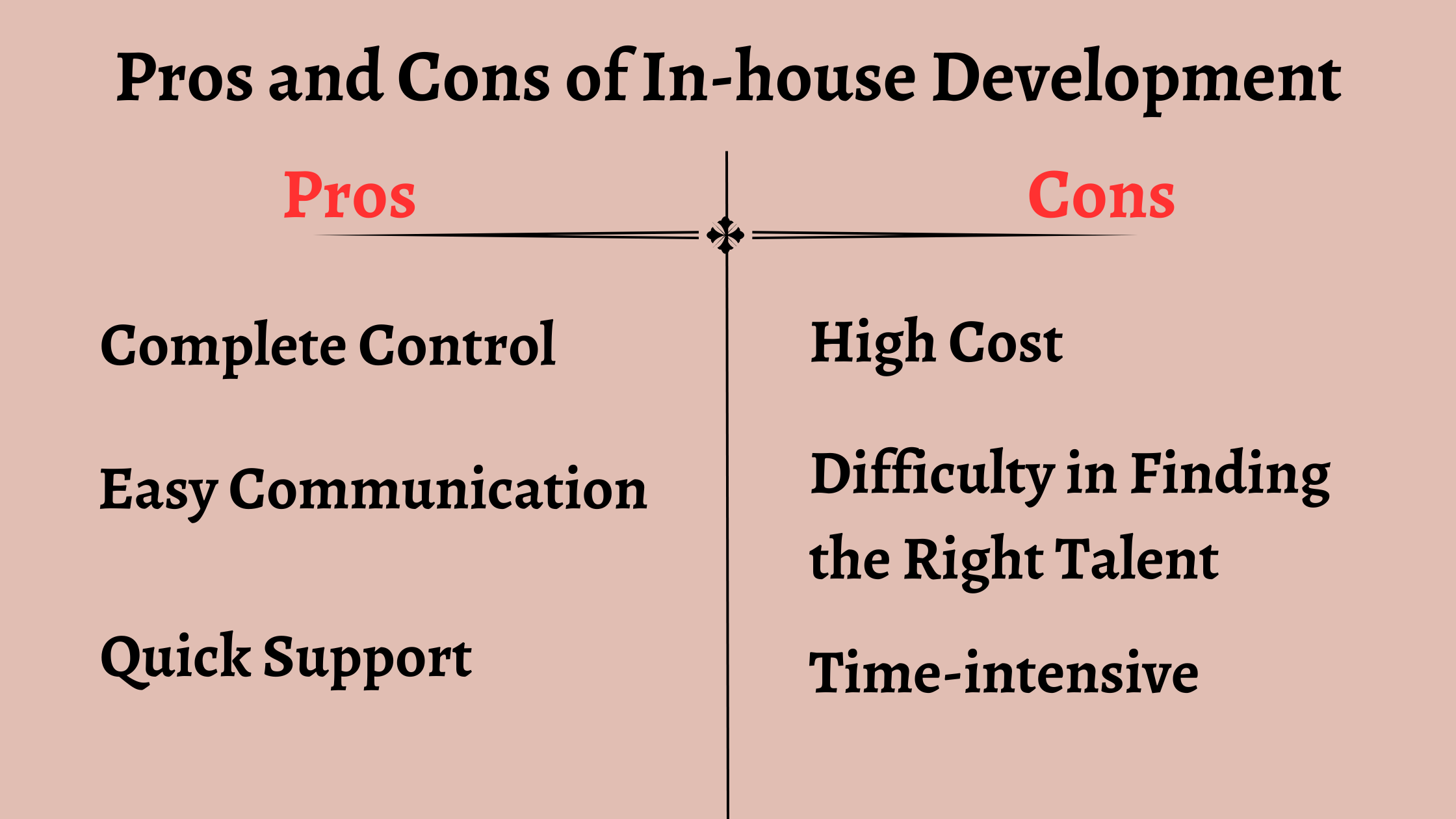
It is a suitable choice if you have the available resources to complete your work. However, it is also to be kept in mind that an efficient team may not always be readily available to work. It takes a proper investment of time and effort to build a team that can help you develop the required web solution.
But, before deciding to select in-house development, it is vital to understand the pros and cons of this development type:
Pros of In-house Development
1. Complete Control
One of the topmost advantages of in-sourcing is that you have complete control over your project. This means that the team you hire will work directly for you, as you can oversee their work and ensure that it is done to your satisfaction. Moreover, you will have access to their expertise and knowledge, which can be invaluable in custom software development.
2. Easy Communication
How well you communicate with the developers allows them to work according to your business goals. In the case of in-house software developers, communication is not a barrier, majorly, as they work together at the same location. This will be beneficial, as with any changes in the project, you can easily communicate with them and abstain from any errors just because of miscommunication.
3. Quick Support
The flawless performance of a web solution is essential for a better user experience; to get this done, it is imperative to remove all possible bugs. With an in-house team, you can eliminate the bugs and errors quickly. Also, if you require any modern functionality, their support can help you in the process.
4. Balanced Group
When you hire an in-house software development team, it allows you to select the right team member to form a balanced group. This results in better team involvement on varied projects as per the skills they pursue. For example, all the Magento developers work smartly on this platform, as they are well-informed about the intricacies. While performing their job, they pay attention to every minute detail and ensure a better web solution.
Cons of In-house Development
1. High Cost
One of the disadvantages of in-house development is the high cost. This is because you need to hire a team of developers, pay them, and provide them with the necessary resources and tools to make it feasible for them to work. Also, you may need to invest in training and development of your team, software licenses, and other costs, such as overhead costs, office rent, and so on, which can be costly.
2. Difficulty in Finding the Right Talent
This is because of a lack of expertise or a shortage of resources; finding the right talent is very difficult in in-house development. For example, if you want to develop a SaaS-based application with alluring features and functionalities, but the hired technology partner is not skilled in the process, here the investment of your time and money will be wasted. The better way here is to outsource the development to an experienced company.
3. Time-intensive
In-house development is time-intensive because of resource constraints. Due to this, software development may take more time than expected. Sometimes, this will negatively harm your work, as with a slow time to market, you most probability miss out on the opportunities. This results in limiting you from staying ahead of your competitors.
Outsource Development
With the advent of time, outsourcing is becoming a new trend among businesses. They choose to hire a dedicated team of developers and outsource the entire development project. In this case, a specialized company does the complete development work.
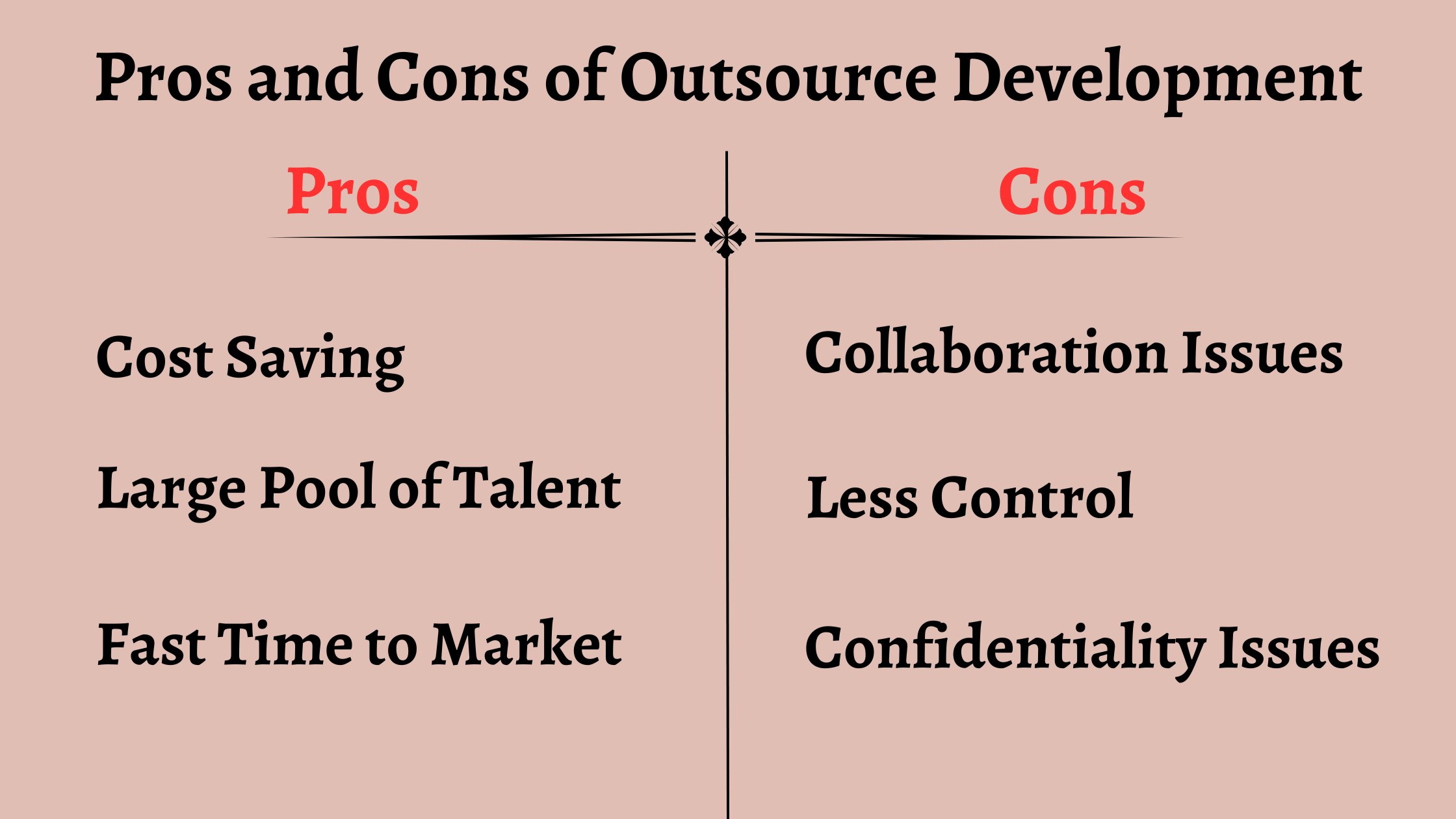
Outsource software development is the process of hiring a third-party company to help you develop a web solution. This is the way to go for businesses that do not have an in-house team or are looking to work with new talents.
If you are planning to outsource your work, it is vital for you to understand the advantages and disadvantages of this development type.
Benefits of Outsource Development
1. Cost Saving
It is cost-effective in this sense, as you only have to pay for the services that you need. This means that by outsourcing, you avoid costs associated with hiring, training, and also retaining full-time employees. Moreover, you do not have to invest in the infrastructure and tools that are mandatory for in-house development.
2. Large Pool of Talent
By outsourcing, you can tap into a range of skilled and talented professionals that might not be available in-house. With that, you employ a team of experienced developers with expertise and understanding of meeting the specific and evolving requirements of a business. Particularly, this can be beneficial for niche technologies or specific domain knowledge-related projects.
3. Fast Time to Market
Working with outsource software development professionals, you can take benefit from their expertise and experience. As they are up-to-date with the latest technical advancements and follow a more efficient approach to complete their task, resulting in faster web solutions. Additionally, they have a variety of resources that allow them to manage multiple projects.
4. Easy Scaling
This development type allows easy team scaling according to your project’s requirements. When your business requirements are highly complex and require more team members, you can easily expand it and can scale down the team if the requirements are simple.
Cons of Outsource Software Development
1. Collaboration Issues
Healthy collaboration brings positive results. With outsourcing, collaboration is one such issue that creates hindrances. The majority of the time, the outsource technology partner is located outside your current time zone, which can lead to communication delays resulting in missed deadlines. Also cultural differences can also make it difficult to collaborate efficiently.
2. Less Control
Outsourcing developers do not exactly work for you because they have various tasks in their pipeline. Also, direct access to their team members is not possible. Fixing a minor issue or a bug in your web solution may take some days or even weeks, resulting in a lack of control over the project.
3. Confidentiality Issues
Confidentiality can be an issue as the agency has access to your business data because there is always a risk of potential data leakage. However, this can also be a risk to in-house development. Your outsource partner can stop responding or contacting any time, as this can be horrifying for a company worried about data theft. However, signing an NDA (Non-Disclosure Agreement) with the outsourcing agency can help you in preventing security breaches.
Factors to Consider Before Deciding on In-house vs Outsource Software Development
Various factors play an essential role in ensuring that you are making the right decision as per the requirements of your business. They shape the path ahead, guiding a business through complex decisions. Enlisted are some of the main ones below:
1. Project Complexity
The complexity of your project is one of the factors that plays its part in shaping which path to move on. Both modes of development are well-suited for simple to complex projects, but this factor will dictate which mode suits best for the project.
For complicated projects that require more support, control, and coordination among team members, the in-house approach suits better. Comparatively, outsourcing your project to a technology partner can be beneficial for projects that are not complex with clearly defined scopes. These professionals can efficiently handle the requirements of the project, which results in freeing up internal resources for other critical tasks.
2. Required Level of Expertise
This also plays a crucial role in determining which development type to select. With in-house development, you get direct access to the skilled personnel of the company, aiding seamless collaboration. On the other hand, if the project requires necessary skills that are not readily available in-house, here outsourcing can provide access to experts that meet the required proficiency. It potentially accelerates project completion and results in faster time to market.
3. Quality Assurance
It is important to understand which one to choose. A high-quality standard web solution is one that meets all your business and the expectations of your consumers. When it comes to custom software development, evaluating the usability and performance of the final output is of utmost importance. Setting a baseline for performance and customer satisfaction is essential for any project.
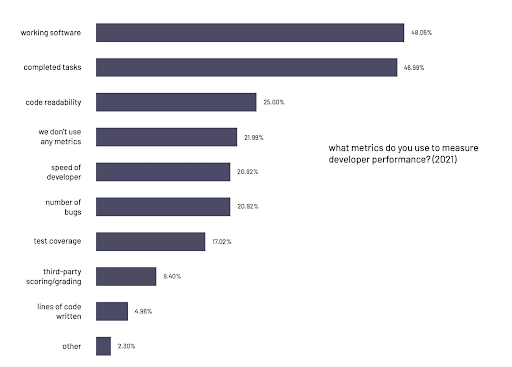
With software development outsourcing, you get access to a wide range of talented professionals. Their expertise and thorough understanding can let them develop a bug-free web solution, resulting in a higher level of quality assurance. On the other hand, the in-house team will provide a better quality of work with more visibility on how the actual project is going.
4. Budget
The decision-making process heavily relies on financial factors. Higher initial costs, including salary, benefits, infrastructure, and continuing maintenance, are often associated with in-house development. Comparatively, external providers frequently have resources and operational efficiencies, outsourcing might instead result in cost savings by eliminating these overheads. It’s critical to compare these financial factors to the project’s long-term objectives and possible revenue streams.
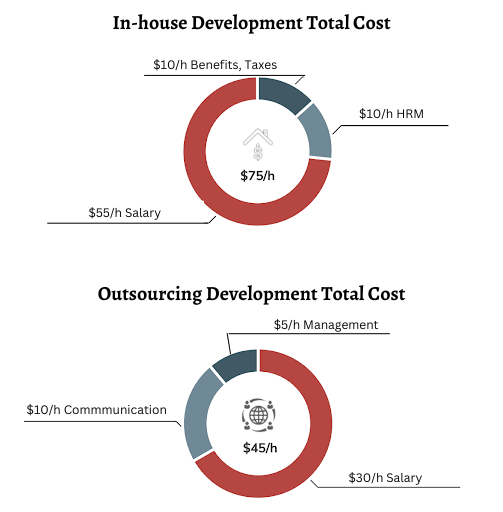
Making the Decision
There are various challenges that are associated with choosing between the two. It is essential to consider the pros and cons of both types.
When In-house development is suitable?
In-house software development can be the right choice for you if you are:
- Looking to invest in long-term development,
- Seeking for greater control,
- Want to utilize existing resources,
- Looking for highly complex and secure web solutions.
When to opt for Outsourcing your Project?
Project outsourcing to a technology partner can be an appropriate choice if you are:
- Looking for a quick turnaround time,
- Want to develop highly complex web solutions,
- Looking to work with specialized talents at lower costs.
Experience Difference in Outsource Custom Software Development with CSSChopper?
CSSChopper is dedicated to building custom and user-friendly web solutions by employing the right industry methods. We are a reliable outsourcing company having a range of talented professionals. Our team has completed more than 8,000 projects with a 98% client satisfaction ratio.
We make sure that your web solution adheres to the industry standards. Our team understands your business objectives, target audience and work as it requires.

